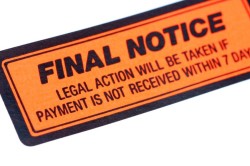Top Class Actions’s website and social media posts use affiliate links. If you make a purchase using such links, we may receive a commission, but it will not result in any additional charges to you. Please review our Affiliate Link Disclosure for more information.

In the U.S., the Fair Debt Collection Practice Act (FDCPA) is designed to protect people facing debt collector abuse. The FDCPA provides strict rules and standards for debt collectors, as they are in a potential position of power and abuse. The FDCPA is designed to be partially enforced through FDCPA lawsuits.
In this case, Plaintiff Rosa R. alleges in a newly filed FDCPA lawsuit that Arrow Financial, Asset Recovery Solutions, and several related companies have engaged in debt collector abuse—by harassing her over a debt that never existed in the first place.
According to the plaintiff’s FDCPA lawsuit, Arrow Financial filed a court case against her in April of 2008, alleging that she owed a debt of $1,193.32 from a GE Money credit card. GE Money typically issues these cards through furniture stores as a way of financing furniture purchases.
The plaintiff asserts that she was never properly served, and was unaware of this court case. As such, she did not show up and was unable to dispute the debt. The judge summarily ruled in favor of Arrow Financial, and tacked on court costs amounting to $125.00, bringing the alleged debt up to $1357.46.
Rosa alleges the unfair debt collection lawsuit that she first became aware of all of this in February of 2012, when Arrow Financial attempted to garnish her wages to pay for this debt.
In her FDCPA lawsuit, Rosa states that she has never had a GE Money Bank credit card, and has never purchased furniture or home goods on credit. Confused and concerned, Rosa sought legal council, and was able to get a court to overturn the previous case, declaring that she owed Arrow Financial nothing. By April 2012, the courts had ruled that Rosa had no debt to Arrow Financial.
But in November of 2013, Rosa received a series of debt collection letters from a company called Asset Recovery Solutions. Her FDCPA lawsuit holds that these were mailed directly to her instead of her legal council.
The first of these letters said that she now owed $2,037.24 thanks to “interest.” Additionally, calculations listed in the FDCPA lawsuit assert that according to the information provided in the debt collection letter, the amount due had been inflated beyond what the stated 9 percent interest rate would actually yield.
Rosa’s lawyers filed a request for proof of the debt, as well as legal documents showing that the debt had been overturned by the courts. According to the FDCPA, a debt collector must reply to such a demand for proof of the debt within 30 days. However, Asset Recovery did not respond.
More fundamentally, Rosa’s FDCPA lawsuit holds that since the debt in question never existed in the first place, the entire collections process has been a farce.
Her FDCPA lawsuit states that while all of this was going on, Rosa was barely making rent, helping to put her son through school. The constant threat of having her wages garnished over a debt the courts ruled to nonexistent took an enormous emotional toll, according to her FDCPA lawsuit.
This FDCPA lawsuit is Case No. 6462, filed in the United States District Court for the Eastern District of New York.
Join a Free Unfair Debt Collection Class Action Lawsuit Investigation
If a lender or debt collector engaged in unfair debt collection practices, you may have a legal claim and could be owed compensation for violations of the Fair Debt Collection Practices Act (FDCPA).
DISCLAIMER: Debt collection itself is not illegal. However, debt collection firms collecting on consumer debts must adhere to the FDCPA. Even though debt attorneys are investigating these companies, their debt collection practices may be legal.
ATTORNEY ADVERTISING
Top Class Actions is a Proud Member of the American Bar Association
LEGAL INFORMATION IS NOT LEGAL ADVICE
Top Class Actions Legal Statement
©2008 – 2024 Top Class Actions® LLC
Various Trademarks held by their respective owners
This website is not intended for viewing or usage by European Union citizens.















One thought on FDCPA Lawsuit Goes After Harassing Debt Collectors
Please include me.